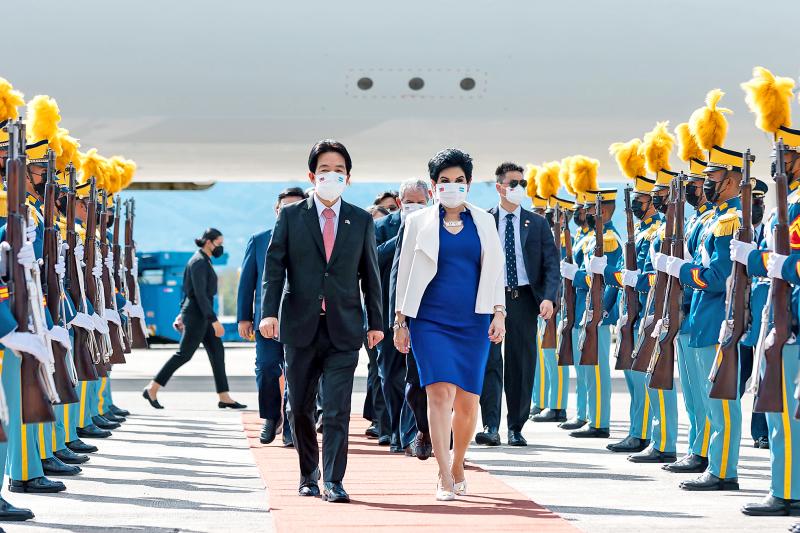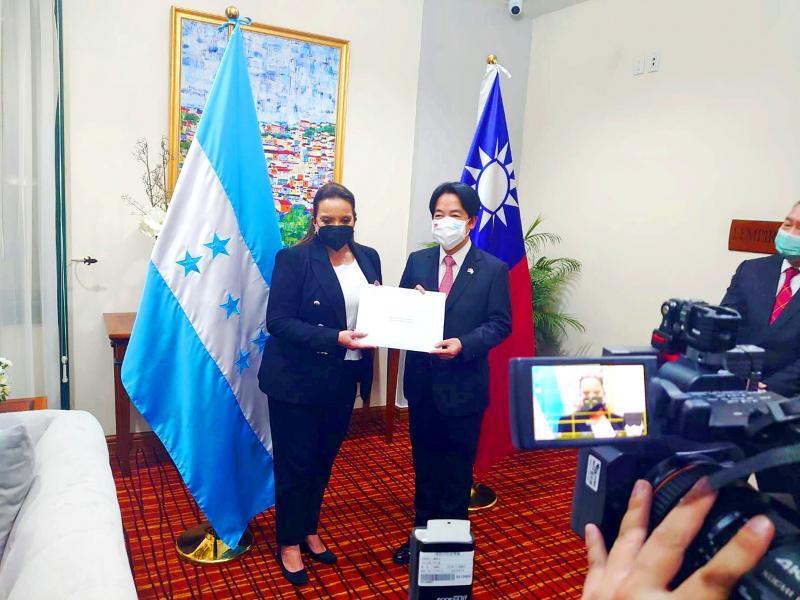Honduras is grateful for the support Taiwan has provided and hopes to maintain their relationship, Honduran president-elect Xiomara Castro said on Wednesday after meeting Vice President William Lai (賴清德), who is in the country to shore up shaky ties.
Honduras is one of 14 countries with formal diplomatic relations with Taipei.
Castro floated the idea of ditching Taipei for Beijing in her election campaign.

Photo: AP / Presidential Office
China has ramped up pressure to reduce Taiwan’s international footprint.
In comments to Taiwanese media after meeting Lai, who is in Honduras for the presidential inauguration yesterday, Castro thanked Taiwan.
“The people of Honduras are always grateful to the people of Taiwan for their support that they have always given us,” she said in a video clip carried by the Central News Agency (CNA).

Photo: CNA
“We have worked together hand in hand for many years and hope to maintain this relationship,” she added.
Lai had been due to hold formal talks with Castro and deliver materials to combat the COVID-19 pandemic, but that was canceled, a CNA report said, adding that they met later for about seven minutes.
Lai told Castro that Taiwan would increase its cooperation with Honduras and promote their friendship, the report added.
Posting a picture of him meeting Castro on Twitter, Lai wrote in English: “Honoured to attend the transfer of power ceremony tomorrow, and help strengthen the friendship between our democratic countries.”
US Vice President Kamala Harris is also going to Castro’s inauguration, potentially giving Lai a chance to meet her, although US officials have indicated that there would be no formal meeting.
In the run-up to Honduras’ election in November last year, a visiting US delegation made it clear that Washington wanted the Central American country to maintain its relations with Taiwan.
The US has been worried about growing Chinese influence in its back yard.
Harris’ arrival is a boost for Castro in the dispute over control of Honduras’ congress and in addressing its weak economy, Netherlands Institute for Multiparty Democracy in Central America director Luis Leon said.
It means the US has an “opportunity to position its interests on issues such as migration and maintaining the country’s relations with its ally Taiwan,” Leon said.
Beijing has been stepping up efforts to win over Taiwan’s remaining diplomatic allies, re-establishing relations with Nicaragua last month, and has openly said that it is aiming to reduce the number to zero.

MISINFORMATION: The generated content tends to adopt China’s official stance, such as ‘Taiwan is currently governed by the Chinese central government,’ the NSB said Five China-developed artificial intelligence (AI) language models exhibit cybersecurity risks and content biases, an inspection conducted by the National Security Bureau (NSB) showed. The five AI tools are: DeepSeek, Doubao (豆包), Yiyan (文心一言), Tongyi (通義千問) and Yuanbao (騰訊元寶), the bureau said, advising people to remain vigilant to protect personal data privacy and corporate business secrets. The NSB said it, in accordance with the National Intelligence Services Act (國家情報工作法), has reviewed international cybersecurity reports and intelligence, and coordinated with the Ministry of Justice Investigation Bureau and the National Police Agency’s Criminal Investigation Bureau to conduct an inspection of China-made AI language

LIMITS: While China increases military pressure on Taiwan and expands its use of cognitive warfare, it is unwilling to target tech supply chains, the report said US and Taiwan military officials have warned that the Chinese People’s Liberation Army (PLA) could implement a blockade within “a matter of hours” and need only “minimal conversion time” prior to an attack on Taiwan, a report released on Tuesday by the US Senate’s China Economic and Security Review Commission said. “While there is no indication that China is planning an imminent attack, the United States and its allies and partners can no longer assume that a Taiwan contingency is a distant possibility for which they would have ample time to prepare,” it said. The commission made the comments in its annual

CHECKING BOUNDARIES: China wants to disrupt solidarity among democracies and test their red lines, but it is instead pushing nations to become more united, an expert said The US Department of State on Friday expressed deep concern over a Chinese public security agency’s investigation into Legislator Puma Shen (沈伯洋) for “secession.” “China’s actions threaten free speech and erode norms that have underpinned the cross-strait ‘status quo’ for decades,” a US Department of State spokesperson said. The Chongqing Municipal Public Security Bureau late last month listed Shen as “wanted” and launched an investigation into alleged “secession-related” criminal activities, including his founding of the Kuma Academy, a civil defense organization that prepares people for an invasion by China. The spokesperson said that the US was “deeply concerned” about the bureau investigating Shen

‘TROUBLEMAKER’: Most countries believe that it is China — rather than Taiwan — that is undermining regional peace and stability with its coercive tactics, the president said China should restrain itself and refrain from being a troublemaker that sabotages peace and stability in the Indo-Pacific region, President William Lai (賴清德) said yesterday. Lai made the remarks after China Coast Guard vessels sailed into disputed waters off the Senkaku Islands — known as the Diaoyutai Islands (釣魚台) in Taiwan — following a remark Japanese Prime Minister Sanae Takaichi made regarding Taiwan. Takaichi during a parliamentary session on Nov. 7 said that a “Taiwan contingency” involving a Chinese naval blockade could qualify as a “survival-threatening situation” for Japan, and trigger Tokyo’s deployment of its military for defense. Asked about the escalating tensions